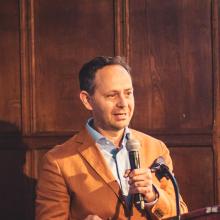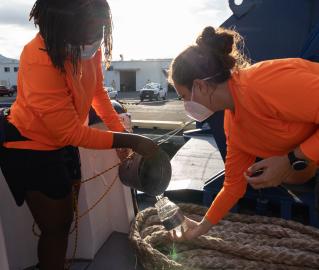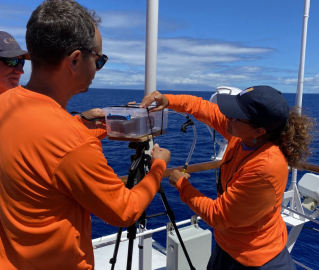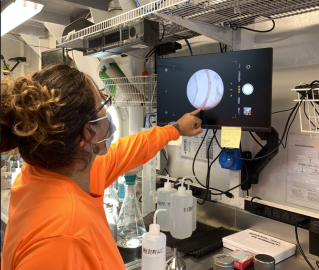
Theo Anagnostopoulos
What is your history of engagement with the National Geographic Society?
I have been a National Geographic Explorer since 2020 when I was awarded a Grant in order to run a project entitled “Integrating Pomak students in Thrace through STEM environmental education”. With expertise in science engagement, science communication and interactive education with a particular focus in underserved communities, we have been working with the culturally and geographically isolated population of the Pomaks in North Eastern Greece. The aim of the project is to create cultural “bridges” between them and their surrounding populations via STEM environmental education.
Tell us about your work/research. What kinds of things do you do?
I am a science engager, a science communicator, and the founder and General Manager of “SciCo” (Science Communication), a non-profit organization aiming to communicate science in a simple and interactive way. We (at SciCo) operate on the following pillars: empowerment and communication. More specifically, we have run more than 300 high-impact outreach activities some of which have now become important milestones internationally. These include a series of popular, annual science festivals namely Athens, Thessaly, Patras, and Mediterranean Science Festivals, “Mind the Lab”, a science festival taking place at metro and train stations around the world, a number of STEM empowerment programs including the award-winning “STEMpowering Youth”, “EcosySTEM”, “STEM4Equality” and Vodafone’s “Generation Next”, and “Celebrity Science”, a popular YouTube show which brings engagement via the contribution of social media influencers.
For the work mentioned above the Explorers Club has included me in their “50 people changing the world” 2022 list.
Since Jan 2022 I am also a Researcher at the Department of Science Communication and the University of Leiden, Netherlands, and my research interests focus is on scientific hesitancy by the public and science education in underserved communities.
What sparked your initial interest in your career?
I grew up in Athens, Greece and from a very early age, I had a keen interest in science. After finishing school, I continued my studies in the UK. Having completed a PhD in Medical Genetics at Kings College London, I returned to work on a Post-Doctoral research in hereditary cancer at the National Center of Scientific Research, “Demokritos” in Athens. Throughout my academic career, I started noticing a deep gap of knowledge between scientists and the general public and the serious consequences of this. This sparked my interest and I started seeking the connection between scientific work and life outside the lab and how this can bring real impact to society. It was then, in 2007, that I entered one of the first “Famelab” competitions worldwide and ended up in the finals. This ignited a career change for me and at the beginning of the Greek financial crisis, I founded “SciCo”.
What element of your work/study is the most fascinating?
There are several aspects of my work that I find fascinating. If I were to name just three, first of all, we need to be very creative so that the educational programs and the outreach activities that we develop are interactive, engaging, and fun. This makes our working days unique and never repetitive. Secondly, we quite frequently see the immediate impact of our work which comes back as testimonials, applause, and requests for more activities, from students, educators, parents and the general public. Finally, there is an exploratory part of our work especially when we work with underserved communities which are quite frequently remotely located.
What other jobs or skills led you to your current position?
There are five main jobs that I have done in my career so far, all of which have contributed to the development of my current skills. More specifically I have been a scientific researcher, an educator, a marketing strategist, an events presenter, and a social entrepreneur. I, therefore, feel that further to the use of some scientific instruments, I have developed storytelling, networking, strategic design, impact assessment, and team-building skills.
What are your degrees and certifications?
Bachelors in Genetics 1994- the University of Newcastle Upon Tyne, UK, Masters in Human Reproductive Biology- Imperial College London 1995, UK, PhD in Medical Genetics- Kings College London 2013, UK, Executive Program in Social Entrepreneurship -Stanford University 2016, Senior Leaders Program for Nonprofit Professionals -Columbia University 2019, PADI Advanced Open Diving certificate 2022.
What are your hobbies?
I love playing the piano and composing music.
I have traveled to 94 countries, 35 of them with my young kids (for which we run a YouTube channel).
I also like jogging, dog training and going to the cinema.
What advice would you give someone who wants to have a career like yours?
There are three pieces of advice I would like to give:
1. Develop a scientific mind. This could be facilitated by studying any degree in science or engineering but more important it is to learn how to observe, generate data, “listen” to your data, synthesize, act and then reflect. A scientific was of thinking is applied to all aspects of life and not just any scientific project.
2. Network, collaborate, learn from others and share. Nothing can be achieved by just one person.
3. Follow your passion. Locate your inner passion, feel it and go for it! Work as hard as you can in order to achieve it and you will realize that you have transformed your hobby into a job.
Expeditions
Theo participated in the following Ocean Exploration Trust expeditions:



